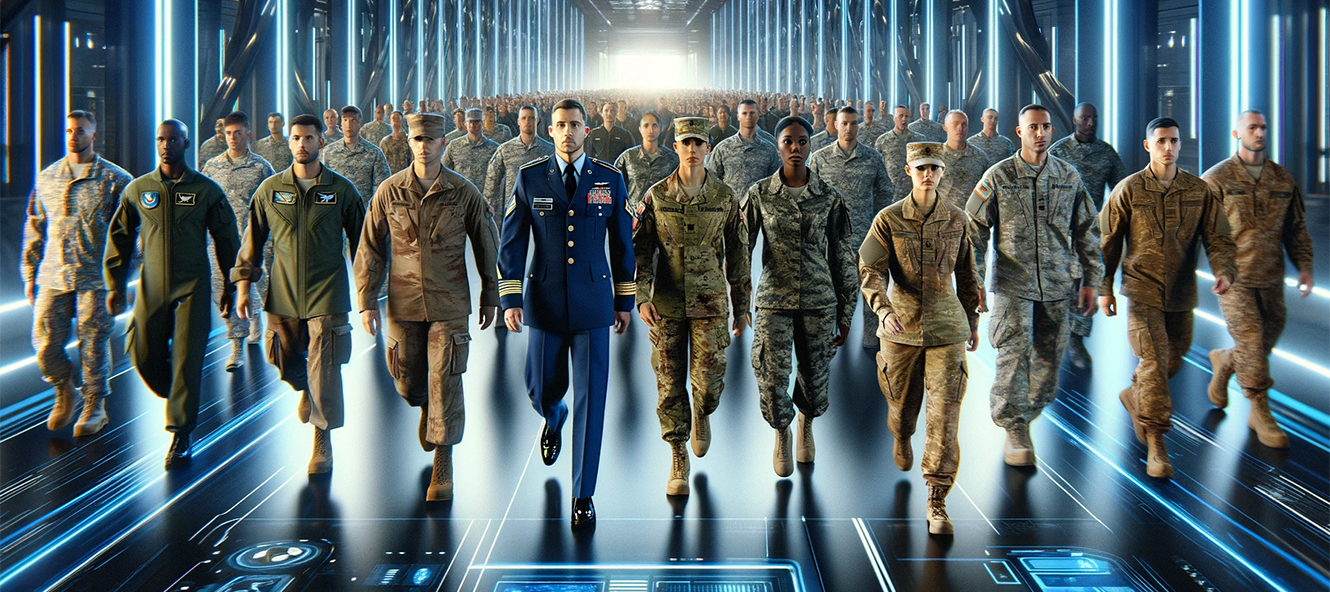As you have already read on this blog, Bedrock is the future of professional learning, which will deliver best-in-class learning in the stream of work. It is also the purest example of dual-use technology, in that the Bedrock SaaS product offers the same features, curriculum and access for commercial enterprises and users as it does for U.S. government in an effort to improve the way enterprises with global interests think, learn, decide, and act. However, we admit to having a big soft spot for the Defense Department. That’s why the military services are our main effort in the first phase of this company (a future post will talk about our plans with private sector customers, where we are already making progress).
And that’s why the Air Force is our first customer, with an initial purchase of thousands of annual licenses.

For many years now, the U.S. armed services recognized they need to join the age of lifelong learning. If you’ve been reading this blog, you know Bedrock is a spinoff of War on the Rocks, perhaps the most well-regarded outlet on strategy, defense, and foreign affairs. While running War on the Rocks, I kept hearing the same demand signal from a variety of enterprises on the need for lifelong learning software solutions. These demand signals were especially loud from the Department of Defense. A collection of service-level, joint, and Congressional mandates paint a clear picture of where the Department of Defense was to head. Here are some examples, in chronological order:
- The Air Force’s pathbreaking redesigned curriculum of learning observed, “Today’s Airmen…have grown up in a world where information is ubiquitous…quite literally at their fingertips. They have come to expect tailored learning experiences that meet their needs when and where those needs arise.”
- The U.S. Army Learning concept held: “[T]he Army’s vision is to immerse Soldiers and Army civilians in a progressive, continuous, learner-centric, competency-based learning environment from their first day of service….This focus on innovative personalized learning systems can be revolutionary by making learning entrepreneurial throughout the Army.”
- The Joint Staff insisted, “There is more to sustaining a competitive advantage than acquiring hardware; we must gain and sustain an intellectual overmatch as well.”
- Air Force Instruction 36-2670 is a governing policy that defines and assigns responsibilities for the above-mentioned continuum of learning,” directing Air Education and Training Command (AETC) to “implement new approaches to learning that are learner-focused, modular, accessible, competency-based, and captured in the Airman’s Learning Record.” This applies to enlisted, officer, reserve, guard, and civilian personnel.
- The Department of the Navy said that it must “Develop a naval education enterprise digital network for continuous learning by all Sailors and Marines… that shares the educational assets and learning opportunities of the entire Naval University, as well as those of the American university system and private sector…[and to] Create a more flexible education model based on “stackable” certifications and courses…”
- The Chairman of the Joint Chiefs of Staff called for “a learning continuum that comprises individual training, experience, education, and self-development,” including “beyond the formal schooling offered in the military education and training system” for enlisted leaders, not just officers.
- The 2023 National Defense Authorization Act instructs the Defense Department “to improve readiness and create a culture of lifelong learning,” and asks the Department to determine how to make it “responsive to changing global threats” and to offer “recommendations, including the use of interactive seminars, war games, simulations, experiential learning…”
- The U.S. Army professional development guide for non-commissioned officers explains “NCO self-development is a meaningful, competency-based program that supports a lifelong learning approach to individual development and encourages individual initiative; results in an improved Soldier focus on the profession of arms; links the operational, institutional, and self-development domains of development into a cohesive strategy; and enables a train-ahead approach to development.” (September 2023)
- As of June 2023, the way the Marine Corps evaluates its personnel includes grading on their level of dedication to “lifelong learning.” This order from the Commandant continues that this highest level of grading says about a Marine: “As a result of active and continuous efforts, widely recognized as an intellectual leader in professionally related topics. Makes time for study and takes advantage of all resources and programs. Introduces new and creative approaches to service issues. Engages in a broad spectrum of forums and dialogues.”
- This one stands out of chronological order, but a great deal of valuable R&D, visioneering, and work on standards has been carried out by the Advanced Distributed Learning Initiative.
I think you get the idea. On paper, the Department embraces lifelong education. And while many professionals within the Department of Defense have worked hard on making this a reality and have also launched some promising programs that have increased access to e-learning, there remains no solution that meets the enterprise learning vision that all relevant stakeholders have been calling for. It is a wonderful and even detailed vision, but it is unrealized. It has wisely been mandated, but the mandate has not been met. Intellectual overmatch will only be a dream unless something big changes.
That’s where Bedrock Learning comes in.
We are the first solution that offers courses, serious games, and intelligence streams in such a way that is collaborative, unclassified, and scalable across an entire military service, accessible anywhere there is an internet connection, and designed – first and foremost – to fit in the lives of soldiers, sailors, airmen, marines, guardians, and civil servants as they live their normal (busy) lives. While Bedrock can enhance the valuable teaching that goes on in our country’s professional military education institutions, it is not meant to replace these institutions and what they are doing. It is meant for military users whether they are in a schoolhouse or not. But there are resource limitations in professional military education that Bedrock can serve. A recent Congressionally mandated study on the subject reported:
Unlike civilian universities, Bedrock can and does provide credible curriculum on defense policy and strategy.
Leveraging the War on the Rocks Stable of Experts
My experience starting and running War on the Rocks – perhaps the world’s leading publication on international military and security affairs – confers major advantages in leveraging experts for high-quality, high-credibility learning content, as well as being able to constantly understand and assess Defense Department needs from the most senior levels down to the grunts. This experience has given us access to and deep relationships with experts on a wide range of issues relevant to international security issues, from cyber operations to emerging technologies to conflict. We are re-directing this world-class expertise from online media to lifelong digital learning. That’s why Bedrock’s learning experiences will always have such high credibility, especially among servicemembers and Defense Department civil servants who have been reading War on the Rocks for ten years.
Delivering the Wargaming the Defense Department Needs
I’d like to reflect a little bit about our games and why they are so important to Bedrock and the future of professional learning (as discussed briefly in our second post on this blog). This is one of the things that really makes Bedrock stand apart in how it envisions and delivers learning.
In 2015, then-Deputy Secretary of Defense Bob Work and then Vice Chairman of the Joint Chiefs of Staff Gen. Paul Selva threw down the gauntlet on wargaming in the Department of Defense. While lots of progress has since been made, eight years later, gaming in the Defense Department is still only available to a select few: usually only senior people, and usually only in a physical setting like a conference room. The Department of Defense offers very few unclassified wargames digitally, and none that can be scaled across the total force and can be played over and over again.
This was confirmed by surveys we fielded on War on the Rocks for servicemembers. The survey found that only a very small percentage of servicemembers (single digits) has regular access to wargaming. That’s a big problem because a vast majority of them think such access is important for their careers and for mission success. And they are right. Further, the major advances in online gaming over the last generation has mostly penetrated the realm of Defense Department gaming, to include educational games.
This needs to change.
Bedrock offers educational games. They are designed to replicate the scenarios, dilemmas, and challenges people face throughout their careers. I will be writing more about Bedrock’s approach to gaming in a future post, but for our purposes here, it’s important to note that Bedrock is the only solution on the market that can meet this requirement at scale, to do so in a manner that is collaborative and tightly integrated with online courses and intelligence/informational streams, and to record relevant metrics in the user’s learning record.
The path ahead
We are excited to be working with the Defense Department. Specifically, we are happy to be working with the Air Force this year on delivering learning to thousands of airmen. We hope to build on this relationship by scaling access to Bedrock across the Air Force and to work with the other armed services.
I fully admit the Department of Defense is not an easy customer. It is slow and highly bureaucratic. Sclerosis and red tape can defeat even the most well-meaning, competent, and energetic professionals, whether they are servicemembers, civil servants, or contractors. But as long as we can continue to find partners and champions from the very top leaders on down, we can and will succeed.
Key Takeaways
- Bedrock’s current main effort is the Department of Defense, with the U.S. Air Force as our first customer.
- For many years, the U.S. armed services recognized they need to join the age of lifelong learning. This realization is evident in service-level, joint, and Congressional mandates.
- However, this vision is unrealized, despite the hard work of so many.
- Bedrock delivers on this vision and is ready for Defense Department customers.
- Bedrock can augment and relieve pressure on resource-constrained professional military education institutions.
- Bedrock’s learning content is powered by the War on the Rocks stable of experts.
- Its wargames in particular set it apart from other solutions and will deliver on acute and longstanding Defense Department needs.
